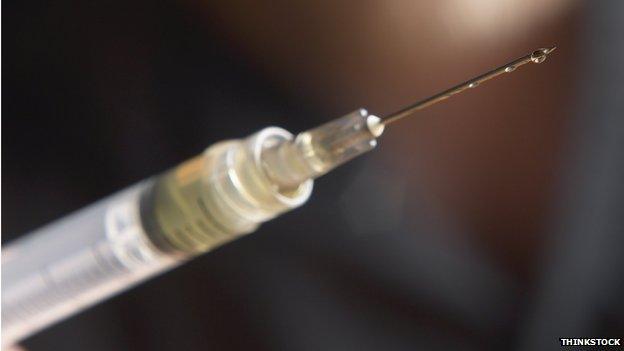Meningitis vaccine plan after steep rise in new strain
- Published

Teenagers will soon be vaccinated against deadly meningitis W after a steep rise in the number of cases, Public Health England has announced.
There were 22 confirmed cases in 2009, 117 last year and experts predict even more cases in the future.
Meningitis W also has a higher-than-usual death rate.
The government's Joint Committee on Vaccination and Immunisation called for 14 to 18-year-olds to be vaccinated "as soon as possible".
There are six different kinds of meningococcal infection which lead to meningitis known as A, B, C, W, X and Y.
MenW was rare but a new strain of the bacterium is causing severe disease in teenagers and young adults.

Meningitis
Meningitis is an infection of the meninges - the membrane that surrounds the brain and spinal cord
Meningococcal bacteria are common and carried harmlessly in the nose or throat by about one in 10 people
They are passed on through close contact
Symptoms include a high fever with cold hands and feet, agitation, confusion, vomiting and headaches
Parents and patients should not wait for a rash to develop before seeking medical help

Prof Andrew Pollard, chairman of the Joint Committee on Vaccination and Immunisation, said: "We have seen an increase in MenW cases this winter caused by a highly aggressive strain of the bug.
"We reviewed the outbreak in detail at JCVI and concluded that this increase was likely to continue in future years unless action is taken.
"We have therefore advised the Department of Health to implement a vaccination programme for teenagers as soon as possible which we believe will have a substantial impact on the disease and protect the public's health."
The recommendations have been accepted by the government.
Dr Shamez Ladhani, from Public Health England, said: "We will now work with the government and NHS England to roll out a vaccination programme.
"It's crucial that we all remain alert to the signs and symptoms of the disease and seek urgent medical attention if there is any concern."
He said doctors were also being urged to keep an eye out for symptoms in all age groups.
Chris Head, the chief executive of the Meningitis Research Foundation, said: "We applaud the quick action by the government to protect 14 to 18 year-olds.
"However, it will take more than a year for this protection to filter through to toddlers and infants, and in the meantime under-fives will still be dying and disabled as a result of MenW.
"But the Bexsero vaccine, mainly regarded as a meningococcal B (MenB) vaccine, also provides protection against MenW and would provide more immediate protection for babies and toddlers.
"This weighs even further in favour of Bexsero being introduced into the routine schedule as quickly as possible."
The JCVI has also recommended introducing a MenB vaccine, but this has not yet come into force.